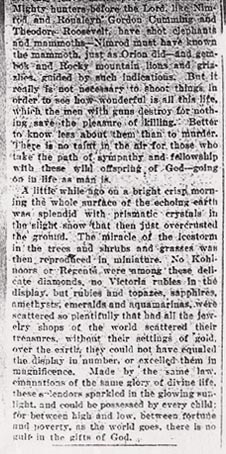
|
THE VARIOUS BEAUTY OF WINTER
The first octave of the new year should
be memorable as compassing about all the
varieties of weather that one can have in
winter. There were two January thaws; a
veritable blizzard, with zero mercury; winds
from every quarter of the heavens -- some-
times from half a dozen nautical points
in the same day; deep snow and green
grass; pussy willows swelling and the frost
out of the ground all through the woodland;
and the first perfect March atmosphere, as
a prophecy. "Fast bind, fast find," was
the motto of the week, hyperbolically twist-
ed to allow of an application which the
old saw never meant. But why so par-
ticular about a traditional meaning, when
the text allows a new one? The life of
earth certainly seemed fast bound, when
the old year went out, and lo, the next
day, rills were running down teh road
and murmuring of spring freshets and
maple sap stirring, and the crows were caw-
ing lustily. Saunterers afield have seen
creepers and nuthatches and little red-
headed woodpeckers, but strange to relate,
they have missed the bluejay, with his
shrieks of gay malice over the pines.
The winter country in our region never
quite loses the spring foresight, and the
moving of the air has brought these pre-
monitions, or rather these free anticipa-
tions of the busy life that will presently
fulfil them in blue hepatiens on early sun-
warmed brooksides and the slopes of south-
ern hills. [/] One cannot walk abroad with-
out the sense of that intense companion-
ship of the deathless impulse beneath this
masking repose of winter. [/] Hearty and
wholesome sweetness breathes out from
the falling snow and the keen northern
breezes, as well as in the south winds that
woo the buds of the trees and start the
aments? of many a shrub and tree to ex-
pectancy. Now, too, the mosses and
lichens are freshening, and the tree stumps
begin to shine with vermillion dots that will
in a month be full fruit.
Also the squirrels are abroad, and one
comes with a sense of delight on their
dining-rooms, at the foot of great hem-
locks, where they have fed royally on
hickory and mockernut, butternut, chest-
nut and acorn; and under the pines the
cone scales lie from which the seeds have
been removed. But little does the squir-
rel, or the rabbit, or the multitudinous
mouse, exhibit of himself to the race so
hostile as that of man. Their evidences
are patent, but for themselves they are
exclusive, and will not enter human so-
ciety if they can help it. So one can
tell where the grouse have rested or fed,
for they leave their spoor for testimony.
|

S.H.D. Commonplace Book (16:35:1),
Martha Dickinson Bianchi Collection,
John Hay Library, Brown University Libraries
|
Mighty hunters before the Lord, like Nim-
rod and Ropaleyn Gordon Cuming and
Theodore Roosevelt, have shot elephants
and mammoths -- Nimrod must have known
the mammoth, just as Orion did -- and gem-
bok and Rocky mountain lions and griz-
zlies, guided by such indications. But it
really is not necessary to shoot things in
order to see how wonderful is all this life,
which the men with guns destroy for noth-
ing save the pleasure of killing. Better
to know less about them than to murder.
There is no taint in the air for those who
take the path of sympathy and fellowship
with these wild offspring of God -- going
on in life as man is.
A little while ago on a bright crisp morn-
ing the whole surface of the echoing earth
was splendid with prismatic crystals in
the slight snow that then just overcrusted
the ground. The miracle of the icestorm
in the trees and shrubs and grasses was
then reproduced in miniature. No Kohl-
noors or Regents were among these deli-
cate diamonds, no Victoria rubies in the
display, but rubies and topazes, sapphires,
amethysts, emeralds and aquamarines, were
scattered so plentifully that had all the jew-
elry shops of the world scattered their
treaures, without their settings of gold,
over the earth, they could not have equaled
the display in number, or excelled them in
magnificence. Made by the same law,
emanations of the same glory of divine life,
these splendors sparkled in the glowing sun-
light, and could be possessed by every child;
for between high and low, between fortune
and poverty, as the world goes, there is no
gulf in the gifts of God.
|

